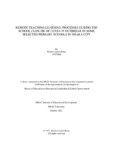| dc.contributor.advisor | Islam, Md Tariqul | |
| dc.contributor.author | Rema, Rechel Auditi | |
| dc.date.accessioned | 2021-12-02T04:18:39Z | |
| dc.date.available | 2021-12-02T04:18:39Z | |
| dc.date.copyright | 2021 | |
| dc.date.issued | 2021-10 | |
| dc.identifier.other | ID 19357046 | |
| dc.identifier.uri | http://hdl.handle.net/10361/15685 | |
| dc.description | This thesis is submitted in partial fulfilment of the requirements for the degree of Masters of Science in Early Child Development, 2021. | en_US |
| dc.description | Cataloged from PDF version of thesis. | |
| dc.description | Includes bibliographical references (pages 35-39). | |
| dc.description.abstract | The highly contagious nature of novel coronavirus disease (COVID-19) forced the
Bangladeshi government to shut down all the educational institutions since March 18, 2020.
This prolonged closure not only caused interruption of in-person schooling but also increased
anxiety and uncertainty among them. The present study aimed to explore the perception of
the teachers, students and parents regarding remote teaching-learning process as an
emergency response to reduce the study gap during COVID-19 pandemic. With a semistructured
interview guide, data for this qualitative study were collected from 12 purposively
selected participants (teachers, students and parents) who are associated with government
primary schools, using telephone and Zoom interviews. Result suggested that participants are
satisfied with the ongoing remote teaching-learning process considering the practices as an
emergency response to the sudden school closure. However, participants (teachers, students
and parents) also expressed their dissatisfaction based on the challenges they have faced due
to scarcity of the resources, and unequal accesses and opportunities for all. Participants
shared their views on Zoom platform as the best modality in remote teaching-learning
process due to the opportunity of video interaction. Very few teachers were found to take
short examination remotely; instead they are assessing the students through the given home
works and home assignments. The paper concludes with few recommendations such as
providing digital devices to the teachers and students to participate in remote class; facilitate
rigorous training to enhance technology-based skills and capacities of the teachers and
students; inclusion of a robust monitoring and evaluation system for the successful
implementation of remote teaching-learning initiatives and development of the blended
teaching-learning framework in the education system according to the context and the socioeconomic
status of the beneficiaries to get the expected outcome in terms of designing
effective remote teaching-learning programs and strategies during any emergency situation. | en_US |
| dc.description.statementofresponsibility | Rechel Auditi Rema | |
| dc.format.extent | 42 pages | |
| dc.language.iso | en | en_US |
| dc.publisher | Brac University | en_US |
| dc.rights | BRAC University thesis reports are protected by copyright. They may be viewed from this source for any purpose, but reproduction or distribution in any format is prohibited without written permission. | |
| dc.subject | Remote teaching-learning | en_US |
| dc.subject | Covid-19 | en_US |
| dc.subject | Government primary education | en_US |
| dc.subject | Dhaka city | en_US |
| dc.subject.lcsh | Education, Elementary | |
| dc.subject.lcsh | Internet in education | |
| dc.subject.lcsh | Teaching -- Computer network resources. | |
| dc.subject.lcsh | Computer-assisted instruction. | |
| dc.title | Remote teaching-learning processes during the school closure of Covid-19 outbreak in some selected primary schools in Dhaka city | en_US |
| dc.type | Thesis | en_US |
| dc.contributor.department | Institute of Education Development, BRAC University | |
| dc.description.degree | M. Early Child Development | |

